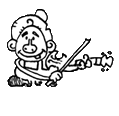They say, “First things first.” But who are they? How did they come to know so much? What do they eat for breakfast Sorry, I have no answers to these deep and important questions. But cliches are cliches for a reason (even if we’re sick of hearing them).
First things first is a useful approach to practicing music, in particular the first phrase of a tune. I’ve been trying to learn about business recently and one term that I learned about in a book is “return on investment”. I was joking with an in-person student named Jim about how mastering the first part of a tune has a high ROI. But it’s true; this is a good investment of your time.
So my big tip of the day:
Learn and master the first quarter of a tune before moving on.
Why learning the first phrase is a good idea:
- If you master this little piece you capture the essence of the tune. You’ll have the rhythmic feel and perhaps the main melodic idea.
- It’s often repeated, so by learning the first phrase, you’ve automatically learned other parts of a tune.
- If you get this down, you will have more confidence as you move through the tune.
- Knowing this well will help you memorize and remember the tune. If you can start a tune, you can usually remember it. It’s like the first phrase is the key that unlocks the door of the tune.
Let’s look at Kesh Jig as an example. It’s first quarter is:
D3-3-3-A0-1-A0-0-0-1-3
This is also the third quarter, so if you really learn this well, you know half of the A part. Every time you get to this part your brain can relax a little because your brain does not have to figure out what to do. It’s become a habit. Or like a cliched, “The grass is always greener on the other side,” (in Ireland, the grass actually is greener).You don’t have to think about each word. You instantly get the full meaning from the phrase.
In addition to this saving of mental resources, you’ll feel more confident about learning the rest of the tune. You’ll quietly say to yourself, “Self, we got this”.
The rhythm of the Kesh Jig example is LONG-SHORT-SHORT-SHORT-SHORT. That rhythm is recycled in the first, second and third quarters of the B part. Since you took the time to master this before moving on to the rest of the tune, it’s much easier for you to learn and play these parts.
Finally, once you’ve memorized the entire tune or piece, the first quarter becomes a key to unlock the tune. Usually if I can a little part of tune (usually the first quarter but not always) then I can start there and the rest of the tune will come to me.
Last words: first things first.
Lessons complete in Module 1.3:


This makes so much sense. I’ve been guilty of zooming through the songs. Your lessons have taught me so much already – I’ve gone back to the beginning because it is all helping me. Love the slow scale too – it has helped develop my ear and tuning.
Kate,
I’ve been finding going back to the beginning, too! Love finding solidarity in this community focused on building a strong violin foundation 🙂
Good advice, Jason, that I need to adhere to. I have a tendency to semi-learn the first part, then move on. When I try to put the two parts together, I haven’t learned either well. I think that is human nature. I have to fight this human nature and adopt violin nature!
It’s all a learning process and you must have patience and forgiveness for yourself, just don’t give up!!
I’m having to learn to read music in a violin class and I find that if I get the first 2-3 measures down it helps me get a sense of the tune and the rest goes a bit easier. Great advice as always -thank you
I’ve been a PGA teaching professional for 28 years, and I’m really keen on the biomechanics of what ever motor skill I’m teaching or learning. I’ve also had THREE carpel tunnel surgeries, so I’ve got bad hands. But why is the thumb of the bow hand supposed to be curved?
Thanks!
Ram
Oh BTW. Jason, how can I contact you personally? I have a couple of questions.
Thanks
Ram
I’ve been putting off learning the fiddle for years because it’s so difficult, but this program might get me over the hump.
My main issue is it’s so freaking loud and obnoxious when a novice is learning to play. I fabricated my own mute, so as to keep my bride out of my colonic aperture while I’m practicing she’s home.
I’ve played guitar and bass since I was 12, and I started on mando about 3 years ago, how long do you think it will take for me to become proficient? I’m going to join a Pete Wernick class in Evanston this fall, but do you know of my good instructors in Chicago? How about at the Old Town School?
Thanks
Ram
This is actually a relief! Thanks!
You’re welcome.